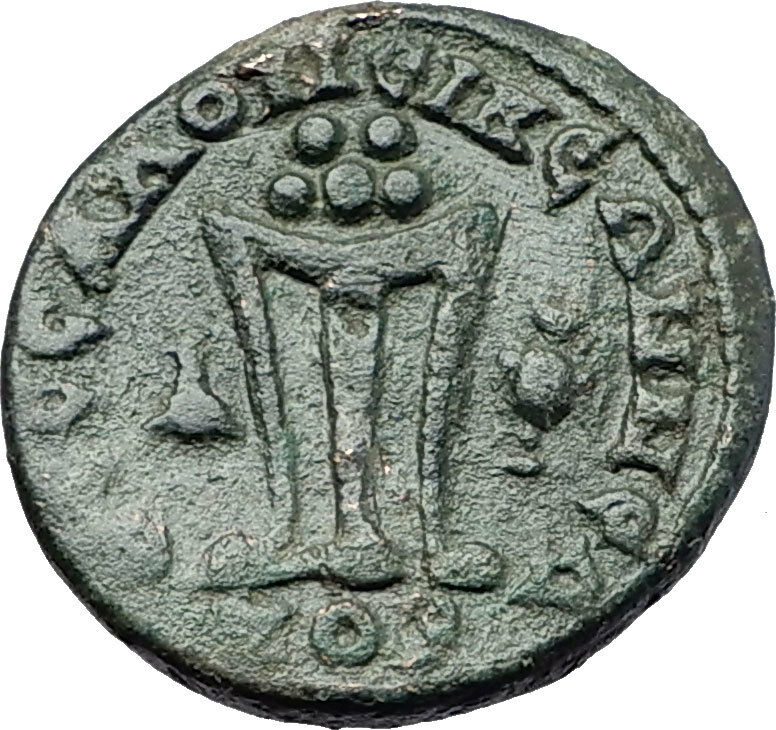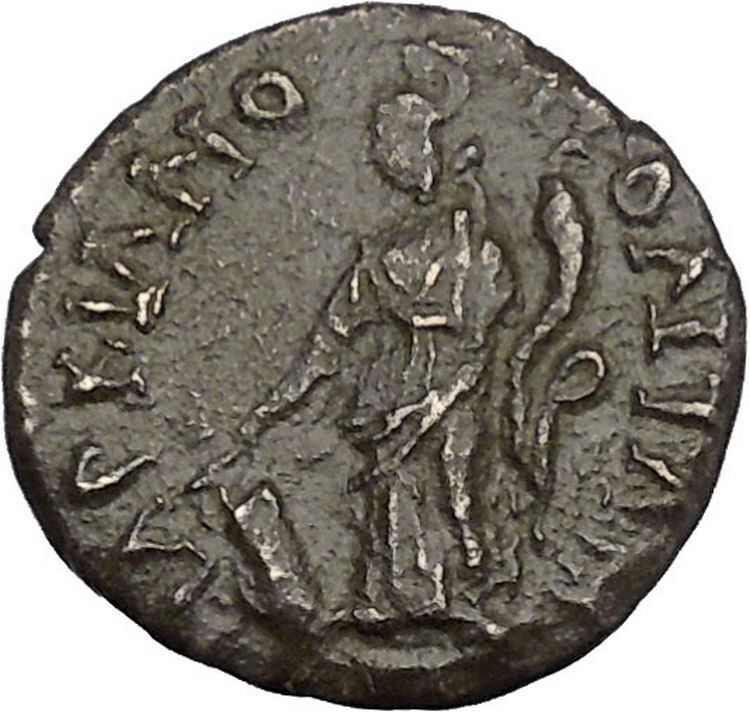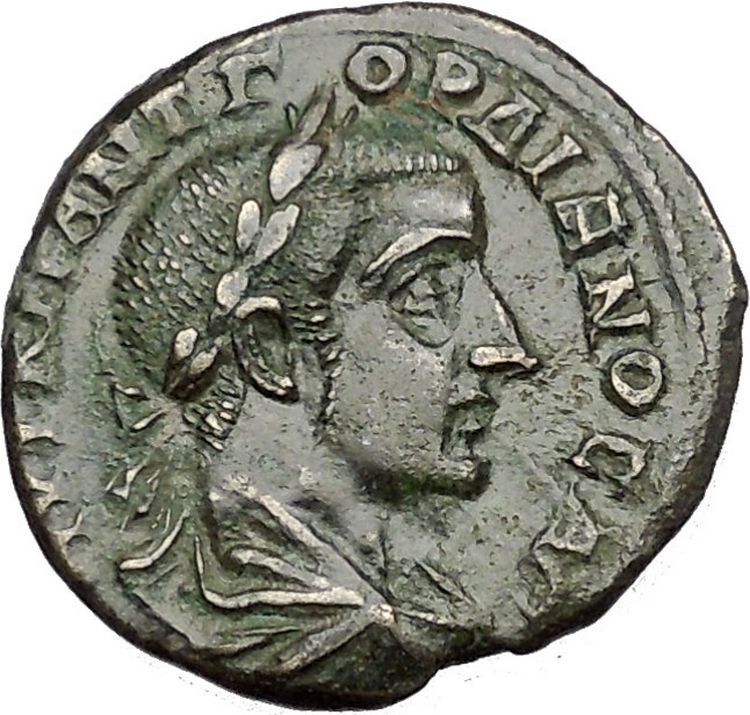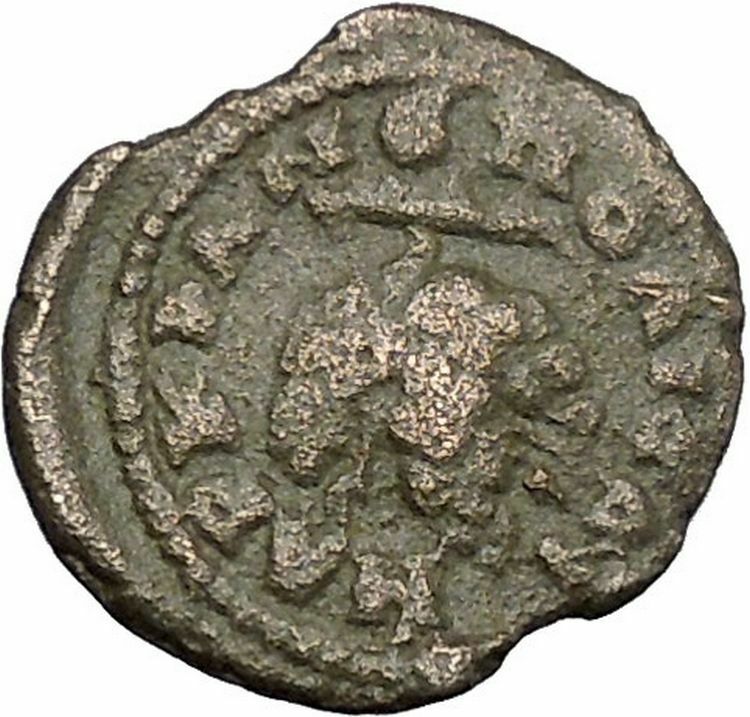|
Macrinus
–
Roman Emperor
: 217-218 A.D. –
Bronze 26mm (12.05 grams) of
Marcianopolis in Moesia Inferior under Legate Furius Pontianus
AV K OΠΠEΛ CEVH MAKPEINOC K M OΠΠEΛ ANTΩNINOC
ΔΙΑΔΟVΜΗ, Bare head of Diadumenian on left
facing right towards laureate head of his father, Macrinus, facing left on
right.
VΠ ΠONTIANOV MAPKIANOPOΛEITΩN,
Nude
Hercules
You are bidding on the exact
item pictured, provided with a Certificate of Authenticity and Lifetime
Guarantee of Authenticity.
Hercules is the Roman name for the Greek
divine
hero Heracles
, who was the son of
Zeus (Roman equivalent
Jupiter
) and the mortal
Alcmene
. In
classical mythology
, Hercules is famous for his
strength and for his numerous far-ranging adventures.

The Romans adapted the Greek hero’s iconography and myths for their
literature and art under the name Hercules. In later
Western art
and literature and in
popular culture
, Hercules is more
commonly used than Heracles as the name of the hero. Hercules was a
multifaceted figure with contradictory characteristics, which enabled later
artists and writers to pick and choose how to represent him. This article
provides an introduction to representations of Hercules in the
later tradition
.
Labors of Hercules
Hercules is known for his many adventures, which took him to the far reaches
of the
Greco-Roman world
. One cycle of these
adventures became
canonical
as the “Twelve Labours,” but the list
has variations. One traditional order of the labours is found in the
Bibliotheca
as follows:
- Slay the
Nemean Lion
.
- Slay the nine-headed
Lernaean Hydra
.
- Capture the
Golden Hind of Artemis
.
- Capture the
Erymanthian Boar
.
- Clean the Augean
stables in a single day.
- Slay the
Stymphalian Birds
.
- Capture the
Cretan Bull
.
- Steal the
Mares of Diomedes
.
- Obtain the girdle of
Hippolyta
, Queen of the
Amazons
.
- Obtain the cattle of the monster
Geryon
.
- Steal the apples of the
Hesperides
.
- Capture and bring back
Cerberus
.
The Latin
name Hercules was borrowed
through
Etruscan
, where it is represented variously
as Heracle
, Hercle, and other forms. Hercules
was a favorite subject for
Etruscan art
, and appears often on
bronze mirrors
. The Etruscan form Herceler derives from the Greek
Heracles via
syncope
. A mild oath invoking Hercules (Hercule!
or Mehercle!) was a common
interjection
in
Classical Latin
.

Baby Hercules strangling a
snake
sent to
kill him in his
cradle
(Roman marble, 2nd
century CE)
Hercules had a number of
myths
that were distinctly Roman. One of
these is Hercules’ defeat of
Cacus
, who was terrorizing the countryside
of Rome. The hero was associated with the
Aventine Hill
through his son
Aventinus
.
Mark Antony
considered him a personal
patron god, as did the emperor
Commodus
. Hercules received various forms
of
religious veneration
, including as a
deity concerned with children and childbirth
,
in part because of myths about his precocious infancy, and in part because
he fathered countless children. Roman brides wore a special belt tied with
the “knot
of Hercules“, which was supposed to be hard to untie.
The comic playwright
Plautus
presents the myth of Hercules’
conception as a sex comedy in his play
Amphitryon
;
Seneca
wrote the tragedy Hercules Furens
about his bout with madness. During the
Roman Imperial era
, Hercules was worshipped
locally from
Hispania
through
Gaul
.
Medieval mythography
After the Roman Empire became
Christianized
, mythological narratives were
often reinterpreted as
allegory
, influenced by the philosophy of
late antiquity
. In the 4th century,
Servius
had described Hercules’ return from the
underworld as representing his ability to overcome earthly desires and vices, or
the earth itself as a consumer of bodies.
In medieval mythography, Hercules was one of the heroes seen as a strong role
model who demonstrated both valor and wisdom, with the monsters he battles as
moral obstacles. One
glossator
noted that when
Hercules became a constellation
, he showed that
strength was necessary to gain entrance to Heaven.
Medieval mythography was written almost entirely in Latin, and original Greek
texts were little used as sources for Hercules’ myths.
Renaissance
mythography
The Renaissance
and the invention of the
printing press
brought a renewed interest in
and publication of Greek literature. Renaissance mythography drew more
extensively on the Greek tradition of Heracles, typically under the Romanized
name Hercules, or the alternate name
Alcides
. In a chapter of his book
Mythologiae (1567), the influential mythographer
Natale Conti
collected and summarized an
extensive range of myths concerning the birth, adventures, and death of the hero
under his Roman name Hercules. Conti begins his lengthy chapter on Hercules with
an overview description that continues the moralizing impulse of the Middle
Ages:
Hercules, who subdued and destroyed monsters, bandits, and criminals, was
justly famous and renowned for his great courage. His great and glorious
reputation was worldwide, and so firmly entrenched that he’ll always be
remembered. In fact the ancients honored him with his own temples, altars,
ceremonies, and priests. But it was his wisdom and great soul that earned
those honors; noble blood, physical strength, and political power just
aren’t good enough.
Marcianopolis, or Marcianople was an ancient Roman city in
Thracia
. It was located at the site of modern day
Devnya
,
Bulgaria
.
The city was so renamed by Emperor
Trajan
Ulpia Marciana, and was previously known as Parthenopolis. Romans repulsed a
Gothic
attack to
this town in 267
(or
268), during the
reign of Gallienus
.
Diocletian
made it the capital of the
Moesia Secunda
province.
Valens
made
it his winter quarters in 368 and succeeding years, Emperor
Justinian
I
restored and fortified it. In 587, it was sacked by the king of the
Avars
but at once retaken by the Romans. The Roman army quartered there in
596 before crossing the Danube to assault the Avars.
Between 893 and 972 it was one of the most important medieval cities in
south-eastern Europe.
Marcus Opellius Antoninus Diadumenianus or Diadumenian
(208–218) was the son of the Roman Emperor Macrinus, and served his father
briefly as Caesar (May 217–218) and as Augustus (in 218). Diadumenian was born
in 14th of September 208 a.C or according to Historia Augusta in 19th of
September 208 a.C because he shared the same birthday with the emperor Antoninus
Pius. His mother was Empress Nonia Celsa, although her existence remains
dubious, because she was only mentioned by the Historia Augusta. He was born
Marcus Opellius Diadumenianus, but his name was changed and added Antoninus to
solidify connection to the family of Marcus Aurelius as done by Caracalla.
Diadumenian had little time to enjoy his position or to learn anything from its
opportunities because the legions of Syria revolted and declared Elagabalus
ruler of the Roman Empire. When Macrinus was defeated on June 8, 218, at
Antioch, Diadumenian followed his father’s death.
Marcus Opellius Macrinus (ca. 165 – June 218) was
Roman
emperor
for fourteen months in 217 and 218. Macrinus was the first emperor
to become so without membership in the senatorial class. Macrinus was possibly
of Berberr
descent.
//
Background
and career
Born in Caesarea (modern
Cherchell
,
Algeria) in the
Roman province
of
Mauretania
to an
equestrian
family, Macrinus received an education which allowed him to
ascend to the Roman political class. Over the years he earned a reputation as a
skilled lawyer. Under the emperor
Septimius Severus
he became an important bureaucrat. Severus’ successor
Caracalla
appointed him
prefect
of the
Praetorian guard
. While Macrinus likely enjoyed the trust of Caracalla, this
may have changed when, according to tradition, he was prophesied to depose and
succeed the emperor. Rumors spread regarding Macrinus’ alleged desire to take
the throne for himself. Given Caracalla’s tendency towards murdering political
opponents, Macrinus probably feared for his own safety should the emperor become
aware of this prophecy. According to Dio, Caracalla had already taken the step
of re-assigning members of Macrinus’ staff.
In the spring of 217, Caracalla was in the eastern provinces
preparing a campaign against the
Parthian Empire
. Macrinus was among his staff, as were other members of the
praetorian guard. In April, the emperor went to visit a temple of
Luna
near the
spot of the
battle of Carrhae
, accompanied only by his personal bodyguard, which
included Macrinus. Events are not clear, but it is certain that Caracalla was
murdered at some point on the trip (perhaps on
April 8
).
Caracalla’s body was brought back from the temple by his bodyguards, along with
the corpse of a fellow bodyguard. The story as told by Macrinus was that the
dead guard had killed Caracalla. By
April 11
,
Macrinus proclaimed himself emperor. Macrinus also nominated his son
Diadumenianus
Caesar
and successor and conferred upon him the name “Antoninus”, thus
connecting him with the relatively stable reigns of the
Antonine emperors
of the 2nd century.
Reign
(April 217 – June 218)
Despite his equestrian background, Macrinus was confirmed in
his new role by the
Senate
.
According to S.N. Miller, this may have been due to both his background as an
accomplished jurist and his deferential treatment of the senatorial class. He
found it necessary, however, to replace several provincial governors with men of
his own choosing. Caracalla’s mother
Julia
Domna
was initially left in peace, but when she started to conspire with the
military he ordered her to leave
Antioch
.
Being at that time in an advanced stage of breast cancer (Cassius Dio) she chose
instead to starve herself to death.
In urgent matters of foreign policy, Macrinus displayed a
tendency towards conciliation and a reluctance to engage in military conflict.
He averted trouble in the province of
Dacia
by
returning hostages that had been held by Caracalla, and he ended troubles in
Armenia
by granting that country’s throne to
Tiridates
, whose father had also been imprisoned under Caracalla. Less
easily managed was the problem of
Mesopotamia
, which had been invaded by the
Parthians
in
the wake of Caracalla’s demise. Meeting the Parthians in battle during the
summer of 217, Macrinus achieved a
costly draw
near the town of
Nisibis
and as a result was forced to enter negotiations through which was
obliged to pay the enormous
indemnity
of 200 million sesterces to the Parthian ruler
Artabanus IV
in return for peace.
Macrinus’ reluctance to engage in warfare, and his failure to
gain victory over even a historically inferior enemy such as the Parthians
caused considerable resentment among the soldiers. This was compounded by the
rolling back of the privileges they had enjoyed under Caracalla and the
introduction of a pay system by which recruits received less than veterans.
After only a short while, the legions were searching for a rival emperor.
At a high point of his popularity monuments were built to
revere Macrinus. The grand
tetrastyle
Capitoline Temple
, in
Volubilis
was erected to honour Emperor Macrinus in 217 AD.
His popularity also suffered in Rome. Not only had the new
emperor failed to visit the city after taking power, but a late-summer
thunderstorm caused widespread fires and flooding, and Macrinus’ appointee as
urban prefect proved unable to repair the damage to the satisfaction of the
populace and had to be replaced.
Downfall
This discontent was fostered by the surviving members of the
Severan dynasty
, headed by
Julia
Maesa
(Caracalla’s aunt) and her daughters
Julia Soaemias
and
Julia Mamaea
. Having been evicted from the imperial palace and ordered to
return home by Macrinus, the Severan women plotted from their home near
Emesa
in
Syria
to place another Severan on the imperial throne. They used their
hereditary influence over the cult of
sun-deity
Elagabalus (the Latinised form of
El-Gabal
) to proclaim Soaemias’ son
Elagabalus
(named for his family’s patron deity) as the true successor to Caracalla. The
rumor was spread, with the assistance of the Severan women, that Elagabalus was
in fact Caracalla’s illegitimate son, and thus the child of a union between
first cousins.
On
May 18
,
Elagabalus was proclaimed emperor by the
Gallica Legio III
at its camp at
Raphana
. A
force under his tutor Gannys marched on
Antioch
and
engaged a force under Macrinus on
June 8
,
218. Macrinus,
deserted by most of his soldiers, was soundly defeated in the
battle
, and fled towards Italy disguised as a courier. He was captured near
Chalcedon
and later executed in
Cappadocia
.
His son Diadumenianus, sent for safety to the Parthian court, was captured at
Zeugma
and also put to death.
Macrinus’ short reign, while important for its historical
“firsts”, was cut short due to the inability of this otherwise accomplished man
to control or satisfy the soldiery. In his death at the hands of Roman soldiers,
Macrinus reinforced the notion of the soldiers as the true brokers of power in
the third-century empire and highlighted the importance of maintaining the
support of this vital faction. His reign was followed by another seventeen years
of rule under the Severan emperors
Elagabalus
and
Severus Alexander
.
|









